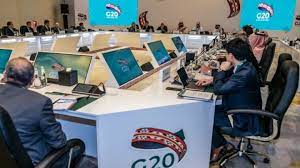At a two-day meeting in Indonesia, the finance ministers of the Group of 20 major nations promised to address global food hunger and mounting debt but achieved few significant policy advancements due to disagreements over Russia’s conflict in Ukraine.
U.S. Treasury Secretary Janet Yellen said the differences had prevented the finance ministers and central bankers from issuing a formal communiqué but that the group had a “strong consensus” on the need to address a worsening food security crisis. She added that concerns were growing about the effectiveness of the G20 in addressing the world’s major problems.
A chair’s statement will be released by the host nation, Indonesia. Most themes were agreed upon by all members, according to Finance Minister Sri Mulyani Indrawati, with the exception of specific declarations regarding the conflict in Ukraine. She said that it was the “best outcome” that the group could have had from this meeting.
Russia, which claims to be carrying out a “special military operation” in Ukraine, is subject to severe sanctions from Western nations. Other G20 countries, such as South Africa, China, and India, have reacted less strongly.
Yellen acknowledged that the fact that Russia is a member of the G20 and disagrees with the rest of us on how to describe the war presents a challenge, but emphasized that this should not stand in the way of progress on crucial global concerns.
The meeting was attended in person by the deputy finance minister of Russia and virtually by the finance minister. Virtually speaking, the finance minister of Ukraine demanded “more harsh targeted sanctions.”
Sri Mulyani of Indonesia noted that while presiding over a divided G20 has been “very daunting” because of the conflict in Ukraine, all participants agreed that food insecurity needs special attention. She urged the repeal of trade restrictions that impeded the flow of food supplies.
To address issues with the supply of food and fertilizer, the G20 will establish a combined forum between the ministers of finance and agriculture. For pandemic preparedness, a similar group has been established for the ministers of finance and health.
Analysts claimed that the inability to reach a consensus on a statement demonstrated the economic alliance’s current frailty.
The G20 is paralyzed by Putin’s conflict, and the G7 is unable to take the lead on global public goods, according to Kevin Gallagher, director of Boston University’s Global Development Policy Center.
At the beginning of the epidemic, G20 members banded together, but efforts to ease the blow for heavily indebted poor countries fell short of expectations.
According to U.S. Ambassador to Japan Rahm Emanuel, Western nations are pressuring Beijing to restructure debt contracts and change its role from one of indebtedness and servitude to one that “contributes” to the country. This is because they are concerned about the lack of transparency in China’s lending. However, they were irritated because Chinese representatives did not physically attend the meetings, making side conversations impossible.
IMF chief Kristalina Georgieva warned that more than 30% of emerging and developing nations and a startling 60% of low-income nations were in or on the verge of debt difficulty.
“The debt issue is getting worse quickly, and there ought to be a well-functioning process for debt resolution,” she said.
According to Sri Mulyani, the G20 also supported continued, orderly, and coordinated progress on the Common Framework for Debt Treatment’s implementation beyond the debt service suspension plan.
According to her, there have been debates about how to improve the framework’s use for underdeveloped nations.

















